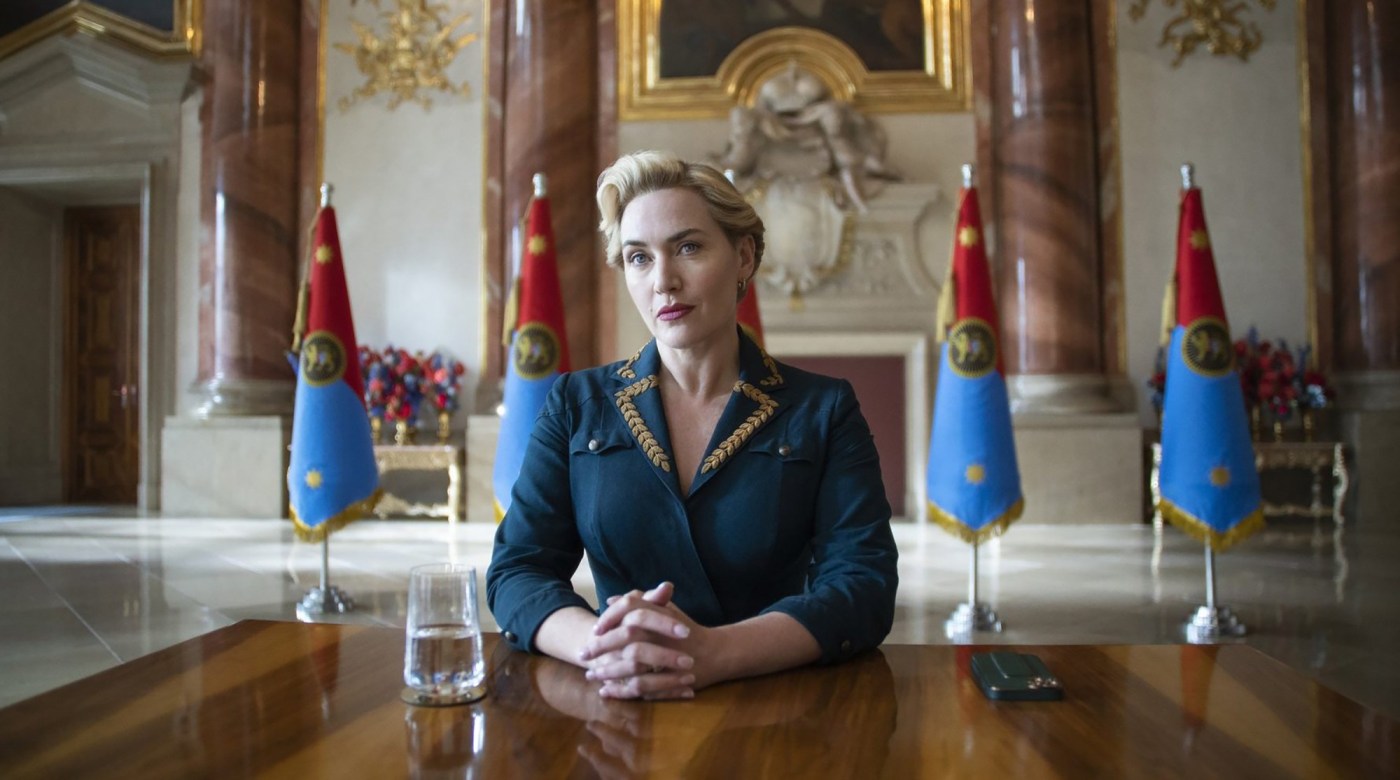
How HBO’s ‘The Regime’ creates comedy from an authoritarian regime
Imagine a world where a country’s leader lived a wildly self-indulgent lifestyle and dictated what was to be considered true, and the leader’s followers either cravenly indulge this or blindly believe it all.
No, this isn’t a documentary. HBO’s “The Regime” may have a bland title, but the fictional series, which premieres March 3, is a wild ride, a dark and absurdist satire of authoritarianism, that finds the funny in the sinister and the brutality in the outlandish.
Set in a fictional Central European country, it centers on the chancellor, Elena Vernham (a mesmerizing, deeply weird Kate Winslet) who rules according to her whims and her paranoia. (She fears her dead father’s disapproval, visiting his glass coffin to pathetically plead her case.)
When she brings in the violent, possibly unhinged army corporal Herbert Zubak (Matthias Schoenaerts) as an aide, sparks fly. He becomes her advisor on everything from his awful country diet to foreign policy, creating new layers of chaos in the palace and the country.
The show’s creator, Will Tracy, honed his political comedy chops writing for “The Onion News Network” and “Last Week Tonight With John Oliver” and refined his skills writing about power and wealth (and tantrums) on “Succession” and his film, “The Menu.”
He spoke recently by video about the central relationship and the geopolitics, the laughs and the fears. This interview has been edited for length and clarity.
Q. This is obviously a political show, but it also feels like you were creating the most toxic version of the Sam and Diane dynamic from “Cheers.”
Herbert originally was a narrative device for the audience to enter this world – a simple country guy who asks, “What is all this?” and “Who are these people? – and he meets everybody, but around page 15 in the pilot, he just faded into the ensemble.
But I was having trouble making Elena emotionally accessible and the story felt mainly bureaucratic and political. Then I realized he was interesting and had the idea that he might actually have something to say and what he says makes her feel very powerful.
So just going back to old precepts of how watchable television works, it became a kind of love story like Sam and Diane. There’s a way in which they make themselves feel for little glimpses like the best version of themselves even though it is an incredibly non-traditional and toxic love story.
Q. Elena has a ruthlessness when it comes to holding onto power; she will sacrifice everyone and everything. There are obviously real-life parallels but how do you make the point without making it too on the nose?
We were interested in making a show that had something to say and felt relevant to our world without feeling like a polemic or didactic in any way. Obviously, humor helps with that. And the characters are not emotionally expressive; they’re very presentational and masked, which helps because they would not get on a soapbox and say what they’re thinking about politics because that would not be in their best interest to do so.
Q. Keplinger, the imprisoned former chancellor, says of Elena that her behavior is born of pain and “you turn their pain to anger and then use it as a cudgel.” But he also says of her, Herbert and their followers that “Broken people love broken people,” which is not so far from Hillary Clinton’s “deplorables” perspective.
Exactly. Keplinger is a representation of the leftist exasperation, “Why do you people love her and not me?” We were being careful to remember that about the left – he’s certainly the preferable option but he is quite craven and needy and narcissistic in his own specific way.
Q. Do you feel any empathy for Elena’s cabinet members as they accommodate and appease in ways we’ve seen in real life?
It’s hard for me to feel that. There’s a story that they tell themselves that they’re doing this for virtuous reasons. But there’s opportunism baked into that feeling of, “I’m going to be the steady hand in there” and sometimes what that means is “I can be that in case this guy gets booted.” They all want to be in pole position. It happens until the moment in which it becomes impossible. And then they’ll do anything to protect themselves. They’ll throw anyone or any idea under the bus to survive.
I was also inspired a bit by reading about Hitler’s big four cabinet and how even when the Soviets were just days from the bunker and all was lost, there was still a sense they were kind of still positioning themselves, they wanted Papa H to like them the best.
Q. What did you learn from your days writing for The Onion News and “Last Week Tonight”? Obviously, “Succession” feels like a natural bridge from there to here.
I think it still stems from The Onion in a way. We were writing these insane, impossible comic stories, but remembering all throughout, even down to the editorial voice style, that it had to have this veneer of verisimilitude. It had to look, sound and feel real, even if what you’re describing is insanity.
Practically speaking, you also have to do your research to give it the flavor and the structure of how these real-world processes work. And on “Succession” as we’ve seen so many times recently, what would never happen has happened in politics and media and business, so we felt emboldened by that.
Q. How did you balance the humor with everyone’s outlandish but often brutal behavior and the realism of the geopolitics?
One thing I learned just in my research is just when you think you’ve written something ridiculous and over the top about an authoritarian leader, you read about real-life figures and think, “Boy, maybe we didn’t push it enough.”
Related Articles
Who is Jeremiah Brent? Meet the new ‘Queer Eye’ design expert following Bobby Berk’s exit
Wolfgang Van Halen says he’s surprised by quick success
What to watch: ‘Shogun’ a worthy remake of classic series
Pop culture-inspired travel is a serious trend in 2024
‘Mea Culpa’ review: In Tyler Perry’s Chicago, attorney-client privileges include sex and painting lessons
The world of the show is so extreme because the character is so extreme and so powerful and has access to unlimited kinds of material resources – Elena can create her own reality, and then everyone around her has to pretend as though it is reality. To me, that is an inherently funny, absurd, dark situation.
The comedy is ingrained in the subject matter and the challenge is remembering that there’s real fear and cruelty and pain that comes out of the world that she creates. We have to remember that she’s a dangerous figure and we owe it to ourselves, especially in the world we live in now, to try to make the geopolitics and the consequences of all that feel real and not like a joke.

